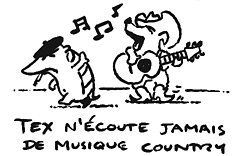Negation
Introduction to negation
Negation is a grammatical term for the contradiction of some or all of the meaning of an affirmative (positive) sentence. In English, a sentence is commonly negated by inserting a single negative word (not, don’t, didn’t, won’t , etc.) into the appropriate place in the sentence. In French, a sentence is commonly negated by inserting two words.
basic negation
Ne … pas is placed around the conjugated verb to negate an affirmative sentence in French. Note that the ne changes to n’ before a verb beginning with a vowel.
| Joe-Bob, l’écureuil, court vite. | Joe-Bob, the squirrel, runs fast. | |
| Edouard, l’escargot, ne court pas vite. | Edouard the snail doesn’t run fast. |
| Trey aime le rap. | Trey likes rap. | |
| Joe-Bob n’aime pas le rap. | Joe-Bob doesn’t like rap. |
alternate forms of negation
There are many other French words that one can use to negate a positive statement besides the basic form ne … pas. Moreover, negative words can be used to contradict the verb as well as other parts of the original affirmative sentence.
| Joe-Bob écoute de la musique country. | Joe-Bob listens to country. | |
| Tex n’écoute jamais de musique country. | Tex never listens to country. | |
| Trey n’écoute que du rap. | Trey only listens to rap. | |
| Fiona n’écoute rien. | Fiona listens to nothing. | |
| Presque personne n’écoute de musique country en France. | Almost nobody listens to country music in France. |


